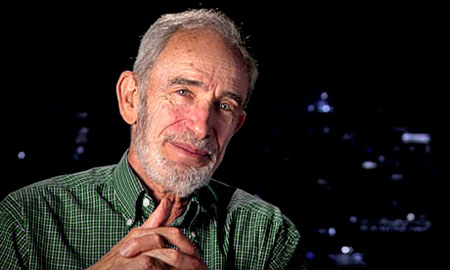
by John Vidal
26 April 2012
from
TheGuardian Website
|
Nuclear disaster or plague likely unless
population shrinks and natural resources are reassigned to poor,
says Prof Paul Ehrlich |

Paul Ehrlich says we face
'catastrophic or slow motion' disasters
unless population is brought
under control and resources redistributed.
Photograph: Rex Features
The world's most renowned population analyst has
called for a massive reduction in the number of humans and for natural
resources to be redistributed from the rich to the poor.
Paul Ehrlich, Bing professor of
population studies at Stanford University in California and author of the
best-selling Population Bomb book in 1968, goes much further than the
Royal Society in London which this morning said that
physical numbers were as important as the amount of
natural resources consumed.
The optimum population of Earth - enough to guarantee the minimal physical
ingredients of a decent life to everyone - was 1.5 to 2 billion people
rather than the 7 billion who are alive today or the 9 billion expected in
2050, said Ehrlich in an interview with the Guardian.
"How many you support depends on lifestyles.
We came up with 1.5 to 2 billion because you can have big active cities
and wilderness.
If you want a battery chicken world where
everyone has minimum space and food and everyone is kept just about
alive you might be able to support in the long term about 4 or 5 billion
people. But you already have 7 billion. So we have to humanely and as
rapidly as possible move to population shrinkage."
"The question is: can you go over the top without a disaster, like a
worldwide plague or a nuclear war between India and Pakistan? If we go
on at the pace we are there's going to be various forms of disaster.
Some maybe slow motion disasters like people
getting more and more hungry, or catastrophic disasters because the more
people you have the greater the chance of some weird virus transferring
from animal to human populations, there could be a vast die-off."
Ehrlich, who was described as alarmist in the
1970s but who says most of his predictions have proved correct, says he was
gloomy about humanity's ability to feed over 9 billion people.
"We have 1 billion people hungry now and we
are going to add 2.5 billion. They are going to have to be fed on more
marginal land, from water that is purified more or transported further,
we're going to have disproportionate impacts on how we feed people from
the population increase itself," he said.
"Most of the predictions [in Population Bomb] have proved correct. At
that time I wrote about climate change. We did not know then if it was
warming or cooling. We thought it was going to be a problem for the end
of this century.
Now we know it's warming and a problem for
the beginning of the century; we didn't know about the loss of
biodiversity. Things have been coming up worse than was predicted. We
have the threats now of vast epidemics".
"I have a grim view of what is likely to happen to my children and
grandchildren. Politicians can control the financial mess we are in but
they don't have control over the systems of the planet that provide us
our food, our welfare, those are deteriorating and it will take us a
long time to turn it around if we start now.
It's hard to think of anything that will pop
up and save us. I hope something will but it really will be a miracle."
But he agreed with the Royal Society
report that
said human population and consumption should not be divided.
"[They] multiply together. You have to be
deal with them together. We have too much consumption among the rich and
too little among the poor. That implies that terrible thing that we are
going to have to do which is to somehow redistribute access to resources
away the rich to the poor.
But in the US we have been doing the
opposite. The Republican party is wildly in favor of more
redistribution, of taking money from the poor and giving it to the
rich."

